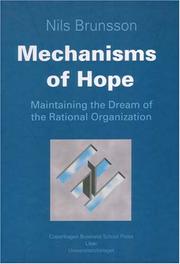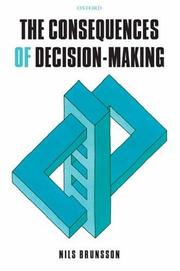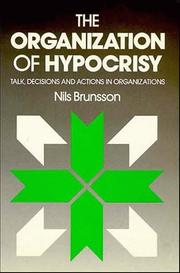| Listing 1 - 7 of 7 |
Sort by
|
Book
ISBN: 9780198296706 0198296703 9786612336546 1282336541 0191570389 0191860190 9780191570384 Year: 2009 Publisher: Oxford Oxford University Press
Abstract | Keywords | Export | Availability | Bookmark
 Loading...
Loading...Choose an application
- Reference Manager
- EndNote
- RefWorks (Direct export to RefWorks)
Large contemporary organizations seem to be in an almost continual state of change. Whether in public or private organizations, managers are trying to implement new organizational forms, introduce new procedures or systems, or change the attitudes of employees. Such reforms often yield disappointing results, and so new reforms are deemed necessary.In this book, Nils Brunsson considers why reform takes place. He looks at why reforms occur when they do, why they propagate certain ideas to the exclusion of others, and what their consequences are. He emphasizes the role of social institutions, fas
Organization theory --- Organizational change. --- 65.01 --- Change, Organizational --- Organization development --- Organizational development --- Organizational innovation --- Management --- Organization --- Manpower planning --- Methods and methodology. Theory and practice of organization --- 65.01 Methods and methodology. Theory and practice of organization --- Changement organisationnel --- Organizational change --- Management. --- E-books --- Administration --- Industrial relations

ISBN: 8763001454 9788763001458 Year: 2006 Publisher: Copenhagen Copenhagen Business School Press
Abstract | Keywords | Export | Availability | Bookmark
 Loading...
Loading...Choose an application
- Reference Manager
- EndNote
- RefWorks (Direct export to RefWorks)
Organization theory --- #SBIB:35H302 --- #SBIB:35H303 --- #SBIB:35H300 --- #SBIB:316.334.2A500 --- Organisatieleer: processen --- Organisatieleer: mensen --- Organisatieleer: algemene werken --- Organisatiesociologie: algemeen --- Organizational behavior. --- Organizational change. --- Associations, institutions, etc. --- Corporate culture. --- Office politics. --- Comportement organisationnel --- Changement organisationnel --- Associations --- Culture d'entreprise --- Politique d'entreprise --- Associations, institutions, etc --- Corporate culture --- Office politics --- Organizational behavior --- Organizational change --- Institutions, associations, etc. --- Networks (Associations, institutions, etc.) --- Organizations --- Voluntary associations --- Voluntary organizations --- Social groups --- Voluntarism --- Culture, Corporate --- Institutional culture --- Organizational culture --- Corporations --- Business anthropology --- Change, Organizational --- Organization development --- Organizational development --- Organizational innovation --- Management --- Organization --- Manpower planning --- Behavior in organizations --- Psychology, Industrial --- Social psychology --- Corporate politics --- Politics, Office --- Industrial sociology --- Sociological aspects

ISBN: 0199206287 9786611148904 0191525642 1281148903 1429492759 0191860204 9780191525643 9781281148902 6611148906 Year: 2007 Publisher: Oxford ; New York : Oxford University Press,
Abstract | Keywords | Export | Availability | Bookmark
 Loading...
Loading...Choose an application
- Reference Manager
- EndNote
- RefWorks (Direct export to RefWorks)
Decision-making is one of the defining characteristics of modern organizations. This book collects together the most important writing on decision-making by Brunsson, one of the leading European organizational theorists. The author provides an introduction to this work, brought together for the first time in this volume. - ;Nils Brunsson is one of the leading European organization theorists who has written and researched decision-making in organizations. He has often questioned the rationality of decision-making, and argued that it is as important to understand other consequences of decision-m
Decision making. --- Decision making --- E-books --- Deciding --- Decision (Psychology) --- Decision analysis --- Decision processes --- Making decisions --- Management --- Management decisions --- Choice (Psychology) --- Problem solving

Abstract | Keywords | Export | Availability | Bookmark
 Loading...
Loading...Choose an application
- Reference Manager
- EndNote
- RefWorks (Direct export to RefWorks)
Corporate culture --- Hypocrisy --- Office politics --- Organizational behavior --- Prise de décision Beslissen --- Conflits (gestion) Conflicthantering --- Management (cas concrets) Concreet management --- Organisation Organisatie --- Action (management) Actie (management) --- Management Management --- Behavior in organizations --- Management --- Organization --- Psychology, Industrial --- Social psychology --- Corporate politics --- Politics, Office --- Industrial sociology --- Truthfulness and falsehood --- Culture, Corporate --- Institutional culture --- Organizational culture --- Corporations --- Business anthropology --- Sociological aspects --- Hypocrisy. --- Organizational behavior. --- Corporate culture. --- Office politics.
Book
ISBN: 8763003724 Year: 2019 Publisher: [Place of publication not identified] : CBS Press,
Abstract | Keywords | Export | Availability | Bookmark
 Loading...
Loading...Choose an application
- Reference Manager
- EndNote
- RefWorks (Direct export to RefWorks)
Book
ISBN: 1108696325 1108604994 1108474985 1108683606 Year: 2019 Publisher: Cambridge : Cambridge University Press,
Abstract | Keywords | Export | Availability | Bookmark
 Loading...
Loading...Choose an application
- Reference Manager
- EndNote
- RefWorks (Direct export to RefWorks)
The book explores how various social settings are partially organized even when they do not form part of a formal organization. It also shows how even formal organizations may be only partially organized. Professors Göran Ahrne and Nils Brunsson first established the concept of partial organization in 2011 and in doing so opened up a ground-breaking new field of organizational analysis. An academic community has since developed around the concept, and Ahrne and Brunsson have edited this collection to reflect the current state of inquiry in this burgeoning subject and to set an agenda for future research. Its chapters explain how organization is a salient feature in many social settings, including markets, interfirm networks, social movements, criminal gangs, internet communication and family life. Organization theory is much more relevant for the understanding of social processes than previously assumed. This book provides a new understanding of many social phenomena and opens up new fields for organizational analysis.
Organizational sociology. --- Organization. --- Organisation --- Management --- Organization (Sociology) --- Organization theory --- Sociology of organizations --- Sociology --- Bureaucracy
Book
ISBN: 019881576X 9780198815761 0192547720 0191853283 0192547739 Year: 2018 Publisher: Oxford : Oxford University Press,
Abstract | Keywords | Export | Availability | Bookmark
 Loading...
Loading...Choose an application
- Reference Manager
- EndNote
- RefWorks (Direct export to RefWorks)
The difference between markets and organisations is often exaggerated. In this work, empirical examples are used for describing and analysing how markets are organised, and the similarities and differences between market organisation and the organisation of formal organisations.
Business enterprises. --- Commerce. --- Markets. --- Markt. --- Organisationstheorie. --- Reorganisation. --- Business organizations --- Businesses --- Companies --- Enterprises --- Firms --- Organizations, Business --- Business --- Public markets --- Commerce --- Fairs --- Market towns
| Listing 1 - 7 of 7 |
Sort by
|

 Search
Search Feedback
Feedback About UniCat
About UniCat  Help
Help News
News